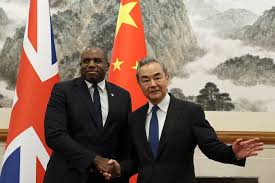Minister visit a boost for Sino-UK ties

On Friday, Lammy had meetings with Chinese Vice-Premier Ding Xuexiang and Foreign Minister Wang Yi. During these meetings, both sides underlined the need to strengthen dialogue and cooperation in the spirit of mutual respect, which serves the long-term interests of both countries.
On Saturday, Lammy met with British business representatives in Shanghai and discussed China-UK economic relations.
“The foreign secretary’s visit to China is a real boost for the morale of the British business community,” said Tom Simpson, managing director of China operations and China chief representative at the China-Britain Business Council. “We are encouraged by the new government’s approach and the prospect of sensible and hopefully sustained engagement with China. British business needs the backing of our government more than ever to ensure our companies can continue to succeed in China, and channel the economic benefits back to the UK.”
China was the sixth-largest trading partner of the United Kingdom in the four quarters to the end of the first quarter of 2024, accounting for 5 percent of total UK trade, according to the UK’s Office for National Statistics.
The trip marks the first visit to China by a member of the new UK Cabinet since the Labour Party took power in July.
Simpson mentioned the “shifting mood music” around China-UK relations in a social media post published in September. He noted that “there appears to be recognition of the need to engage with China in the immediate term”, referring to the phone conversation between Chinese President Xi Jinping and British Prime Minister Keir Starmer in August.
During the phone call, the first between leaders of the two countries since 2022, the two sides agreed to strengthen contacts and dialogue, and to expand exchanges and cooperation.
According to a news release from the UK Foreign, Commonwealth and Development Office regarding Lammy’s visit, the UK will adopt a “stable, consistent and pragmatic “approach to China to support UK and global interests, with engagement deemed “vital”.
It also said, “This will come with a firm recognition that the UK and China will not, and do not, always agree … but we also have shared interests, including a global green energy transition, and deep economic links.”
Consistency in policies
John McLean, chairman of China UK Business Development Centre, expressed hope for real consistency in policies and concrete actions.
“There were signals before, but they were inconsistent in what the signaling actually said. They were erratic. … So you really didn’t know where you stood,” he said. “Consistency breeds confidence, which allows you to actually go and do something, or indeed take a risk.”
Although admitting that businesses may shift their focus toward other countries amid geopolitical uncertainty, McLean said, “China is gonna come back on the agenda just because it’s a significant market and the opportunities are there”.
James Keeley, honorary associate of the Institute of Development Studies, or IDS, a research and learning organization affiliated with the University of Sussex in Brighton, England, said it’s “encouraging “and “welcoming” to see Lammy also making it clear that both countries need to work together on shared global challenges.
“This will hopefully provide a foundation for renewed dialogue and other forms of cooperation between China and the UK on international development,” he said.
In an opinion piece published ahead of Lammy’s visit, co-authored by Keeley and Lewis Husain, a research fellow of the IDS, they emphasize that the UK will now need to recognize China’s significance in addressing all the thorny areas that matter to the UK, especially in a rapidly changing world.





